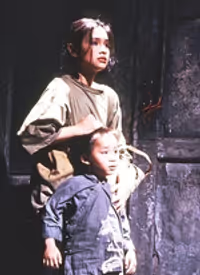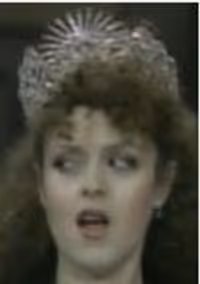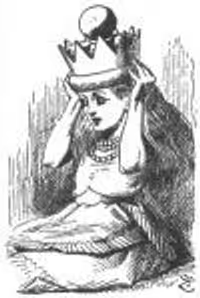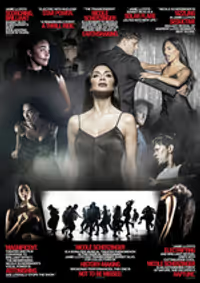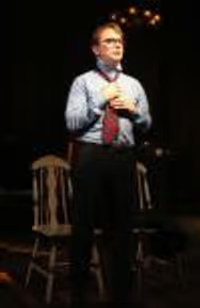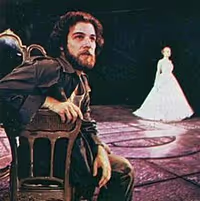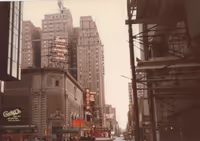Nicole Scherzinger to star in West End Sunset Boulevard at the Savoy
#575Nicole Scherzinger to star in West End Sunset Boulevard at the Savoy
Posted: 2/27/24 at 10:21am
QueenAlice said: "The entire production is built around a meta concept that supposes Nicole Sherzinger is a modern day equivalent to the Norma Desmond character. She doesn't need to 'act' her big songs because she is, as this production conceives, essentially playing herself."
So all lyrics in the show are disregarded because the audience mustn't see a character but only the real life of the person playing it? Is that what it is about? People wanting to see a ****cat doll in real life? How does this translate to when her understudy is on? And why are these lyrics about this certain specific area then? Everything is about the silent film era and the fact that microphones do not exist and how much she hates words.
QueenAlice said: "Seb -- all your citicisms are about what you feel are things that take the audience out of the story *as you think they should see it ."
But what is the story? The story is about the silent film era in each and every little detail. Of course a cardboard cut-out of Andrew Lloyd webber or a laptop with microphone or mc hammer jokes is going to take you out of what is being sung. It was laughing and hollering when I went. It seemed the goal to not have the audience being interested in the story. So why use these lyrics but expect the audience to holler over it and not listen to them and insist that people should not see the story but focus on the celeb actor? That is the real question.
#576Nicole Scherzinger to star in West End Sunset Boulevard at the Savoy
Posted: 2/27/24 at 10:27am
I mean, the entire idea that a silent film star is singing is absurd if you think about it too much. This is theatre - it’s an abstract poetic representation of reality not a photorealistic documentary. I don’t think your reading of the production is what Jamie Lloyd intended or what I take from it.
#577Nicole Scherzinger to star in West End Sunset Boulevard at the Savoy
Posted: 2/27/24 at 10:34am
binau said: "I mean, the entire idea that a silent film star is singing is absurd if you think about it too much. This is theatre ."
The whole role is based on those details and lyrics from that era. Norma singing about these details is her thoughts speaking. That is the essence of musical theatre. But singing about completely different things and expecting the audiences to disregard that and helping them by distracting them with nonsense so much because you don't want them to see the role but focus on the celeb only is not good.
#578Nicole Scherzinger to star in West End Sunset Boulevard at the Savoy
Posted: 2/27/24 at 10:35am
QueenAlice said: "The entire production is built around a meta concept that supposes Nicole Sherzinger is a modern day equivalent to the Norma Desmond character."
And that is because Sunset Boulevard (in its original film incarnation) is itself a piece of meta cinema. The casting of Swanson, the use of her old silent films, von Stroheim's Max, the appearances of DeMille and Hopper as themselves, the casting of the 'wax works'...it is all meta. The other thing to remember is that Sunset Boulevard is not a period pieces. It was set in the present day. There's not a single likeable character in the film...everyone is vampiric. It's a noir comedy that turns into a horror film at the end. It is not, in any way, a tragedy.
The musical presents the work as a period piece (fair if you want to capture the silent film era) and a grand tragedy. I argue it's a misreading of the original property. This production utilizes its leading lady and the meta-ness around her to firmly yank Sunset Boulevard back to what it always was, a dark, comic noir. And boy howdy does it find a way to turn the ending into a horror story.
#579Nicole Scherzinger to star in West End Sunset Boulevard at the Savoy
Posted: 2/27/24 at 10:44am
That's all fine, but that production was based on that era. If you don't want that, write something new, rewrite all the lyrics and present something in which you don't need to distract the audience all the time to prevent them from listening to the show. And don't call it Sunset Boulevard. Call it "Nicole in concert, singing songs about silent films and how she hates words, from a show called Sunset Boulevard written by the cardboard cut-out which is ridiculed during the title song."
Updated On: 2/27/24 at 10:44 AM#580Nicole Scherzinger to star in West End Sunset Boulevard at the Savoy
Posted: 2/27/24 at 11:00am
Oh I think we learned a long time ago that, for example, changing the original time and location of Shakespeare's plays has hardly diminished audience's experience of those stories.
#581Nicole Scherzinger to star in West End Sunset Boulevard at the Savoy
Posted: 2/27/24 at 11:03am
Which can be fun, if the lyrics/lines are neutral or universal. Which is not the case here.
Updated On: 2/27/24 at 11:03 AM
OhHiii
Broadway Legend Joined: 4/30/16
#582Nicole Scherzinger to star in West End Sunset Boulevard at the Savoy
Posted: 2/27/24 at 11:06am
Seb28 said: "I found that part to be lacking, she can sing, but wasn't able to connect it to sincere acting, and half way through the song she kicks and jumps and claps her hands, completely disconnected from the song or character. I just saw Nicole."
So you're admitting here that you're basing your entire opinion based on that bootleg thats online. You haven't even seen this production.
#583Nicole Scherzinger to star in West End Sunset Boulevard at the Savoy
Posted: 2/27/24 at 11:18am
I am talking about when I went. She did this deliberate character breaking in many moments.
OhHiii
Broadway Legend Joined: 4/30/16
#584Nicole Scherzinger to star in West End Sunset Boulevard at the Savoy
Posted: 2/27/24 at 11:36am
Seb28 said: "I am talking about when I went. She did this deliberate character breaking in many moments."
Yeah, I don't buy it.
Either way, by all accounts your perception of this character is so rigid that if Nicole so much as blinked at the wrong time, you'd rip the performance to shreds.
#585Nicole Scherzinger to star in West End Sunset Boulevard at the Savoy
Posted: 2/27/24 at 1:03pm
SonofRobbieJ said: "QueenAlice said: "The entire production is built around a meta concept that supposes Nicole Sherzinger is a modern day equivalent to the Norma Desmond character."
And that is because Sunset Boulevard (in its original film incarnation) is itself a piece of meta cinema. The casting of Swanson, the use of her old silent films, von Stroheim's Max, the appearances of DeMille and Hopper as themselves, the casting of the 'wax works'...it is all meta. The other thing to remember is that Sunset Boulevard is not a period pieces. It was set in the present day. There's not a single likeable character in the film...everyone is vampiric. It's a noir comedy that turns into a horror film at the end. It is not, in any way, a tragedy.
The musical presents the work as a period piece (fair if you want to capture the silent film era) and a grand tragedy. I argue it's a misreading of the original property. This production utilizes its leading lady and the meta-ness around her to firmly yank Sunset Boulevard back to what it always was, a dark, coming noir. And boy howdy does it find a way to turn the ending into a horror story."
^ Yes x 1000
I was always a fan of the musical because I love the music and think its one of if not the best score ALW has written. And the original production was so massive and became such an event (mostly because the off-stage drama helped make it 'meta' if you will on stage). But it never seemed to have the relevance or connect with audiences since the original. The reactions and discussions surrounding this from London was exciting to read and unlike anything I remember from the original run (granted forums, blogs, etc have evolved since then) But I had often wondered how or if they could make this connect for future audiences who wouldn't ever realize that there was a time when movies didn't have sound with them.
SonofRobbieJ got this spot on - Thank you for your patience and gentleness (particularly on this board) in bringing this all together
#586Nicole Scherzinger to star in West End Sunset Boulevard at the Savoy
Posted: 2/27/24 at 1:24pm
chernjam said: SonofRobbieJ got this spot on - Thank youfor your patience and gentleness (particularly on this board) in bringing this all together"
That's very sweet, chernjam!
I also want to point out that, even thought the specifics of Sunset Boulevard is what happened when films went from silent to sound, the show is really about what is lost when technologies change and the people who cannot adapt get left behind. I think most people know that once upon a time, films were silent...and that's all one really needs to know. We are in a time where we will always confront technologies changing industries. It's why the reconceiving of Sunset actually works. It understands that it's bigger than just the specifics of when the talkies arrived and that this story has something to say about the here and now.
#587Nicole Scherzinger to star in West End Sunset Boulevard at the Savoy
Posted: 2/27/24 at 1:33pm
SonofRobbieJ said: "chernjam said:SonofRobbieJ got this spot on - Thank youfor your patience and gentleness (particularly on this board) in bringing this all together"
That's very sweet, chernjam!
I also want to point out that, even thought the specifics of Sunset Boulevard is what happened when films went from silent to sound, the show is really about what is lost when technologies change and the people who cannot adapt get left behind. I think most people know that once upon a time, films were silent...and that's all one really needs to know. We are in a time where we will always confront technologies changing industries. It's why the reconceiving of Sunset actually works. It understands that it's bigger than just the specifics of when the talkies arrived and that this story has something to say about the here and now."
Honestly that's why I can't wait to see this new interpretation. Aside from the bootlegs which for the crappy quality I've found riveting (for both Nicole and Rachel) the idea that this production takes the idea of using "with one look" from a social media obsessed world perspective with the original storyline seems unique and fascinating to engage with
And to hear the score sung with voices that can nail those notes is going to be a thrill
#588Nicole Scherzinger to star in West End Sunset Boulevard at the Savoy
Posted: 2/27/24 at 1:43pm
The other thing I think Jamie Lloyd production does more effectively than any other I've seen is underscore that this is a tale of show business tragedy,, and that the tragedy of show business is that it offers no real happy ending for anyone. Norma Desmond may be delusional but she is the only character in the piece who (even after being completely destroyed) holds unabashadly onto a dream until the final curtain. Nicole Sherzinger's portrayal is real and emotionally shattering in a way it has never been before. I truly didn't care that it didn't have realistic 1959 period elements in the stoytelling when the payoff was so great,
#589Nicole Scherzinger to star in West End Sunset Boulevard at the Savoy
Posted: 2/27/24 at 1:51pm
I truly didn't care that it didn't have realistic 1959 period elements in the stoytelling when the payoff was so great.
SUNSET BLVD takes place in 1949-50.
Penna2
Broadway Star Joined: 2/24/18
#590Nicole Scherzinger to star in West End Sunset Boulevard at the Savoy
Posted: 2/27/24 at 3:17pm
Deleted
Updated On: 2/27/24 at 03:17 PM#591Nicole Scherzinger to star in West End Sunset Boulevard at the Savoy
Posted: 2/27/24 at 3:41pm
QueenAlice said: "The other thing I think Jamie Lloyd production does more effectively than any other I've seen is underscore that this isa tale of show business tragedy,, and that the tragedy of show business is that it offers no real happy ending for anyone. Norma Desmond may be delusional but she is the only character in the piecewho (even after being completely destroyed) holds unabashadly onto a dream until the final curtain. Nicole Sherzinger's portrayal is real and emotionally shattering in a way it has never been before. I truly didn't care that it didn't have realistic 1959 period elements in the stoytelling when the payoff was so great,"
I agree of course that nobody gets what we would consider a happy ending, but I'm sure I'm not the first to point out that part of whats so brilliant, going back to Wilder, is also that every principal character *does* get what they thought they wanted at the beginning. Joe gets his pool, Norma returns to the public spotlight, Betty and Artie will get married, Max directs his queen once more. Even when Hollywood gives you your dream, it's a monkey's paw. It's such a fantastically wicked story.
#592Nicole Scherzinger to star in West End Sunset Boulevard at the Savoy
Posted: 2/27/24 at 6:21pm
SonofRobbieJ said: "the show is really about what is lost when technologies change and the people who cannot adapt get left behind. I think most people know that once upon a time, films were silent...and that's all one really needs to know. We are in a time where we will always confront technologies changing industries. It's why the reconceiving of Sunset actually works. It understands that it's bigger than just the specifics of when the talkies arrived and that this story has something to say about the here and now."
Which has absolutely nothing to do with Nicole and her interpretation. And yet she sings those lyrics.
QueenAlice said: ""The entire production is built around a meta concept that supposes Nicole Sherzinger is a modern day equivalent to the Norma Desmond character. She doesn't need to 'act' her big songs because she is, as this production conceives, essentially playing herself."
Which is also untrue, Norma is disillusioned and desperately longs for her glory days. That has absolutely nothing to do with Nicole who is just a lady with a good career who doesn't accept her age yet. Very different things.
#593Nicole Scherzinger to star in West End Sunset Boulevard at the Savoy
Posted: 2/27/24 at 6:24pm
OhHiii said: "Either way, by all accounts your perception of this character is so rigid that if Nicole so much asblinked at the wrong time, you'd rip the performance to shreds."
Actually, I am very much open to different interpretations as long as they are sincere. Unlike Jamie Lloyd, I do think Nicole is talented enough to play the role in a sincere way without the distractions and without breaking character. She could be great with good direction. But there is some work to be done to get to that point.
#594Nicole Scherzinger to star in West End Sunset Boulevard at the Savoy
Posted: 2/27/24 at 6:33pm
chernjam said: "the idea that this production takes the idea of using "with one look" from a social media obsessed world perspective with the original storyline seems unique and fascinating to engage with"
The lyrics are explicitly and literally not about that but describe something completely different in very fine detail. About the silent music in the silent film era, about no words, putting words to shame, that it's impossible to write them down in a script, etc.
The most fascinating thing here is that some people are determined to disregard the lyrics before they go. That has nothing to do with engaging.
#595Nicole Scherzinger to star in West End Sunset Boulevard at the Savoy
Posted: 2/27/24 at 6:42pm
This production is driving some of y’all to insanity and honestly, it’s probably for the best.
#596Nicole Scherzinger to star in West End Sunset Boulevard at the Savoy
Posted: 2/27/24 at 6:46pm
Curious how you feel about the revival of CHICAGO which removes all time and space from its very 1920s time period
#597Nicole Scherzinger to star in West End Sunset Boulevard at the Savoy
Posted: 2/27/24 at 6:47pm
BroadwayNYC2 said: "This production is driving some of y’all to insanity and honestly, it’s probably for the best."
A discussion about insane direction is always good, but that is something very different.
#598Nicole Scherzinger to star in West End Sunset Boulevard at the Savoy
Posted: 2/27/24 at 6:53pm
QueenAlice said: "Curious how you feel about the revival of CHICAGO which removes all time and space from its very 1920s time period"
I haven't looked into that but it already sounds better than this. Removing time and space at least means not singing that you live in a time where microphones do not exist yet while having a laptop with microphone there, 2 very time-specific things that make sure it does not work.
#599Nicole Scherzinger to star in West End Sunset Boulevard at the Savoy
Posted: 2/27/24 at 7:04pm
QueenAlice said: "Curious how you feel about the revival of CHICAGO which removes all time and space from its very 1920s time period"
I don't think I agree with this at all. It still feels, to me, very "period piece" in the best way. It gives off what it is intended to and why it's been so wildly successful.
This feels gimmicky. This is the definition of a period piece. The whole plot revolves around "talkies" so to take that out just doesn't make sense to the story - to me.
Videos


